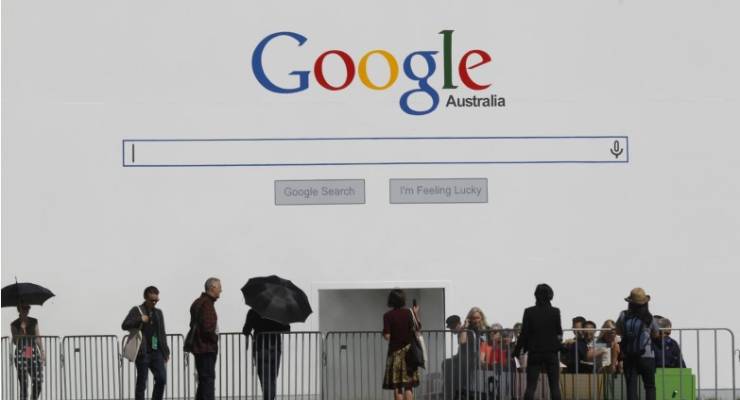
There’s that classic line in The Usual Suspects, where Roger “Verbal” Kint observes, “the greatest trick the Devil ever pulled was convincing the world he didn’t exist.” While Google isn’t fooling the world as to its existence, it does a remarkably good job at fooling almost everyone as to its depravity.
When Google IPOd back in 2004, the company’s founders, Larry Page and Sergey Brin, in a letter to shareholders, famously claimed its motto was “don’t be evil”. Devised by the creator of Gmail, Paul Buchheit, who noted, “It’s … a bit of a jab at a lot of the other companies, especially our competitors, who at the time, in our opinion, were kind of exploiting the users to some extent.”
Could be a little ironic now as when it comes to being evil, there aren’t too many worse than Google. In fact, Google has become the world’s biggest standover man. Imagine a version of the mob, reaching its tentacles over the entire internet-using world, demanding protection money, or else.
How did Google morph from being the world’s best way of finding information to a geeky version of Tommy from Goodfellas? Easy, completely ignore intellectual property and make clients pay millions to advertise on their own brand.
Let me explain.
Google — which is now part of Alphabet, but let’s stick with Google — makes money from selling ad space when people use its search engine. Google doesn’t make a cent from organic search results — the most relevant links resulting from your search. But Google isn’t a US$764 billion business because it does stuff for free. It also shows paid results above and alongside the organic results. This is how Google makes virtually all of its money (the other big contributor is YouTube ads).
So what has Google done that’s so bad?
Say you searched “Qantas”. In this case, the organic results would almost certainly have Qantas at the top — it’s what you searched for and Google’s organic results are highly relevant. However, it would be entirely possible for any other brand to advertise on that keyword. Google says that it “will not investigate or restrict the use of trademark terms in keywords, even if a trademark complaint is received.”
The AFR reported last week that in one of the 57 submissions to the ACCC Digital Platforms Enquiry, Medibank Private claimed that Google’s 2013 policy change in relation to trademarks “meant that what was ours was up for auction and our brands could be properly bid and used by others, including competitors, indeed anyone could bid on brands which had trademark registration”.
I have seen this first hand in my travel business. In 2016, we paid around $250,000 per year to advertise the phrase “Luxury Escapes” on Google. Recently, the cost to advertise our own name skyrocketed to more than $1 million a year. Why? Because a competitor (or more likely, their outsourced digital marketing agency) had been advertising on our name, effectively bidding up the cost .Google works like an auction, requiring advertisers to “bid” for search terms — the more competition for the term, the higher the cost. That’s why terms like “home loans” and “life insurance” are so expensive.
What happened to us is happening across all Google advertisers. Because of the way Google’s auction works, someone else bidding on your name forces the price up for a business bidding for its name. To put it another way, by changing the rules, Google dubiously created bidding competition to force businesses to pay it more money.
At the same time as gouging Australian businesses, Google has historically paid virtually no tax in Australia. While it has indicated it will start paying more, through use of offshore entities, Google has avoided potentially hundreds of millions of dollars of tax. You know, the money that funds our schools, roads and hospitals, but instead now funds Sergey and Larry’s fleet of six private jets and a custom-built US$82 million private airport.
But perhaps the only thing more awry than Google’s moral compass is appalling behaviour of our state politicians, who are literally throwing public money to try to get Google to relocate its Australian headquarters. NSW, Victoria, South Australia and Queensland are desperately courting Google, no doubt greased by even more taxpayer dollars funelling their way to the digital vampire squid.
Here’s another suggestion. Until Google pays back-tax for all the money it owes Australia and stops gouging Australian businesses, block it. One suspects that may make Google a little less evil.
Adam Schwab is a former lawyer, author and the co-founder and CEO of Luxury Escapes








If we have a competition for most evil, Facebok wins hands down. Google is about money, Facebook is about ultimate control.
Stop whinging! “Luxury Escapes” is hardly a trademarkable term, it is a description of a type of holiday. You should have thought a bit more before naming your company.
The devil quote is from Baudelaire, and was just used in a movie.
I just used Google to find the real originator of that quote, Charles Baudelaire:
“La plus belle des ruses du diable est de vous persuader qu’il n’existe pas.”
(The finest trick of the devil is to persuade you that he does not exist)
DuckDuckgo would have worked 🙂
the only solution is to internationalise google – publicly owned by the UN or whatever world federal government can be put in place.
Surely Google should be challenged in court over their disregard of ownership of trademarks and patents.